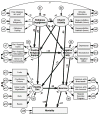Pathways from Religion to Health: Mediation by Psychosocial and Lifestyle Mechanisms
- PMID: 28435513
- PMCID: PMC5397113
- DOI: 10.1037/rel0000091
Pathways from Religion to Health: Mediation by Psychosocial and Lifestyle Mechanisms
Abstract
Religiosity, often measured as attendance at religious services, is linked to better physical health and longevity though the mechanisms linking the two are debated. Potential explanations include: a healthier lifestyle, increased social support from congregational members, and/or more positive emotions. Thus far, these mechanisms have not been tested simultaneously in a single model though they likely operate synergistically. We test this model predicting all-cause mortality in Seventh-day Adventists, a denomination that explicitly promotes a healthy lifestyle. This allows the more explicit health behaviors linked to the religious doctrine (e.g., healthy diet) to be compared with other mechanisms not specific to religious doctrine (e.g., social support and positive emotions). Finally, this study examines both Church Activity (including worship attendance and church responsibilities) and Religious Engagement (coping, importance, and intrinsic beliefs). Religious Engagement is more is more inner-process focused (vs. activity-based) and less likely to be confounded with age and its associated functional status limitations, although it should be noted that age is controlled in the present study. The findings suggest that Religious Engagement and Church Activity operate through the mediators of health behavior, emotion, and social support to decrease mortality risk. All links between Religious Engagement and mortality are positive but indirect through positive Religious Support, Emotionality, and lifestyle mediators. However, Church Activity has a direct positive effect on mortality as well as indirect effects through, Religious Support, Emotionality, and lifestyle mediators (diet and exercise). The models were invariant by gender and for both Blacks and Whites.
Keywords: emotionality; lifestyle; mortality; physical health; religious engagement; social support; worship.
Figures
Similar articles
-
Is investing in religious institutions a viable pathway to reduce mortality in the population?Soc Sci Med. 2020 Oct;262:113106. doi: 10.1016/j.socscimed.2020.113106. Epub 2020 Jun 8. Soc Sci Med. 2020. PMID: 32800393 Free PMC article.
-
Religious Engagement in a Risky Family Model Predicting Health in Older Black and White Seventh-day Adventists.Psycholog Relig Spiritual. 2012 Nov 1;4(4):298-311. doi: 10.1037/a0027553. Epub 2012 Mar 5. Psycholog Relig Spiritual. 2012. PMID: 23560134 Free PMC article.
-
Intrinsic Religiosity and Hypertension Among Older North American Seventh-Day Adventists.J Relig Health. 2016 Apr;55(2):695-708. doi: 10.1007/s10943-015-0102-x. J Relig Health. 2016. PMID: 26330373 Free PMC article.
-
Processes of Religious and Spiritual Influence in Adolescence: A Systematic Review of 30 Years of Research.J Res Adolesc. 2019 Jun;29(2):254-275. doi: 10.1111/jora.12486. J Res Adolesc. 2019. PMID: 31206875
-
Religious Denomination, Religiosity, Religious Attendance, and Cancer Prevention. A Systematic Review.Risk Manag Healthc Policy. 2022 Jan 16;15:45-58. doi: 10.2147/RMHP.S341085. eCollection 2022. Risk Manag Healthc Policy. 2022. PMID: 35079226 Free PMC article. Review.
Cited by
-
Religion and Mental Health in Racial and Ethnic Minority Populations: A Review of the Literature.Innov Aging. 2020 Aug 8;4(5):igaa035. doi: 10.1093/geroni/igaa035. eCollection 2020. Innov Aging. 2020. PMID: 33005754 Free PMC article.
-
A New Approach to Assess Lifetime Dietary Patterns Finds Lower Consumption of Animal Foods with Aging in a Longitudinal Analysis of a Health-Oriented Adventist Population.Nutrients. 2017 Oct 13;9(10):1118. doi: 10.3390/nu9101118. Nutrients. 2017. PMID: 29027960 Free PMC article.
-
Is investing in religious institutions a viable pathway to reduce mortality in the population?Soc Sci Med. 2020 Oct;262:113106. doi: 10.1016/j.socscimed.2020.113106. Epub 2020 Jun 8. Soc Sci Med. 2020. PMID: 32800393 Free PMC article.
-
Religious Affiliations and Clinical Outcomes in Korean Patients With Acute Myocardial Infarction.Front Cardiovasc Med. 2022 Mar 23;9:835969. doi: 10.3389/fcvm.2022.835969. eCollection 2022. Front Cardiovasc Med. 2022. PMID: 35402569 Free PMC article.
-
Plant-based dietary intake moderates adverse childhood experiences association with early mortality in an older Adventist cohort.J Psychosom Res. 2021 Dec;151:110633. doi: 10.1016/j.jpsychores.2021.110633. Epub 2021 Sep 28. J Psychosom Res. 2021. PMID: 34634675 Free PMC article.
References
-
- Boswell G, Kahana E, Dilworth-Anderson P. Spirituality and Healthy Lifestyle Behaviors: Stress Counter-balancing Effects on the Well-being of Older Adults. Journal of Religion and Health. 2006;45:587–602. doi: 10.1007/s10943-006-9060-7. - DOI
-
- Bradley DE. Religious involvement and social resources: Evidence from the data set "Americans' Changing Lives". Journal for the Scientific Study of Religion. 1995;34:259–267. doi: 10.2307/1386771. - DOI
-
- Brandon TH. Negative affect as motivation to smoke. Current Directions in Psychological Science. 1994;3:33–37. doi: 10.1111/1467-8721.ep10769919. - DOI
Grants and funding
LinkOut - more resources
Full Text Sources
Other Literature Sources

